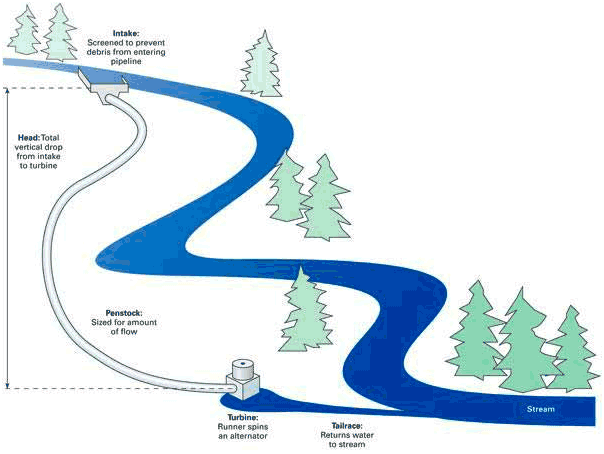While most people associate hydro power with dams, hydro power can also work without dams. This is done by diversion of a portion of the water from fast flowing rivers. Diversion sites are usually done a or near waterfalls or in hilly terrain where “head” can be gained relatively quickly. They don’t appear in wide low flat landscapes because the length of the diversion would have to be great in order to gain sufficient head for the turbine, and long diversion channels are costly. The generating stations at Niagara Falls are an example of diversion hydropower.
Essentially what happens is that the whole system is carefully planned and then an intake feeding a diversion channel or pipe is placed upstream. Sometimes natural features can be used to divert water into the intake and channel on small systems and sometimes a weir is needed to divert some of the flowing river water into the intake. In cases where the intake system directly feeds the “penstock” pipe (as illustrated), the penstock moves the water down to the turbine and creates head pressure with increasing vertical drop. This head pressure essentially captures the energy of the water making it available at the turbine. The water enters the turbine and the turbine concerts the hydraulic power to mechanical power, after which a generator converts the mechanical power to electrical power. The water exits the turbine and returns to the river via the “tailrace”. The distance from where the water first entered the intake upstream to where the water is returned to the river or stream is called the depleted reach, because the “flow” has been depleted by the diverting of water for use by the hydro system.

In other cases, the intake system first feeds a diversion channel into a forebay tank and then a penstock pipe. While the river continues to “run downhill” , the diversion channel continues further downstream with less head loss than the river, and it is continued downstream until the difference in vertical height between it and the river will provide adequate “head” for the planned system. At this point the channel enters a forebay tank which ensures the water is sufficiently deep so that the penstock pipe doesn’t get any air in it. Now that sufficient head exists, the water travels down to the turbine via the penstock pipe.
The decision to choose one of these design methods over the other is mainly a function of cost and practicality of doing one or the other. Note that either of these methods is a traditional hydro design involving penstock pipes and traditional turbines. We at Greenbug do not provide systems of this nature. However a diversion hydro is possible with the Archimedes screw systems we do provide.
In the case of an Archimedes screw diversion system, the water is still diverted via an intake and channel and possibly a weir to help with water diversion upstream, the channel then carries water downstream without losing significant head, while the stream or river loses more head. In the process the vertical head between the channel and river increases. When sufficient head has been gained an Archimedes screw is installed which carries the water from the upper channel back to the river.
A diversion hydro system is also called a run of river hydro system because flows are not managed, water is not stored. Therefore the amount of electricity generated can also vary widely.
